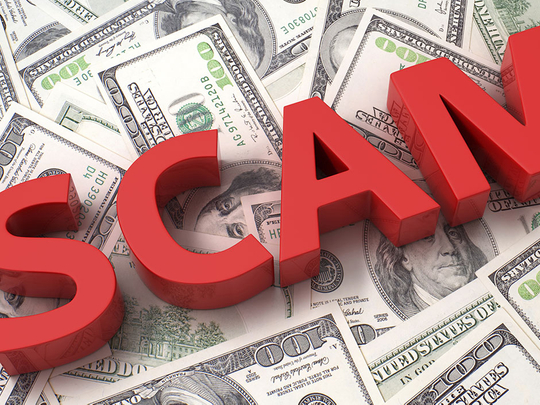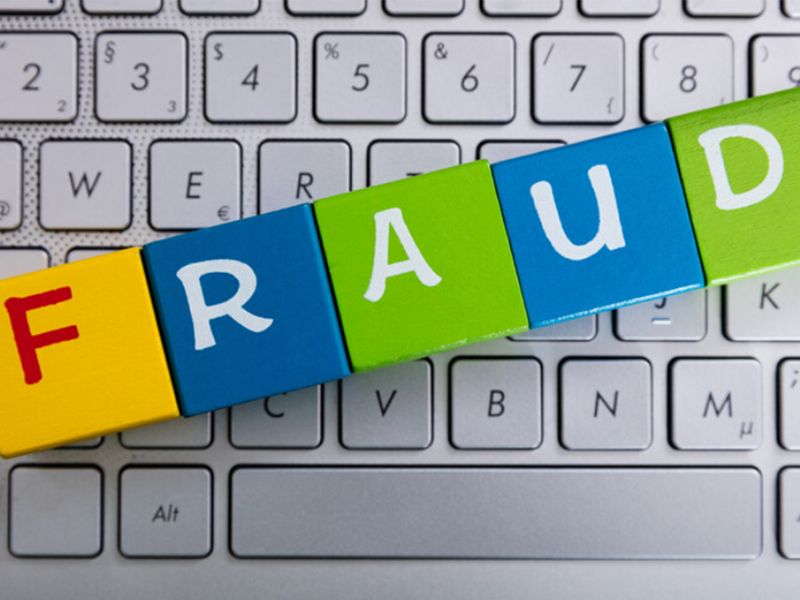
Every year we hear of thousands of people losing millions due to investment scams. The internet and advances in digital communications mean these kinds of scams are becoming more common and harder to identify.
Here is a look at the most common ones out there and how they target investors using similar techniques.

Ponzi and pyramid scheme
These schemes recruit people through ads and e-mails that promise everything from making big money working from home to turning Dh10 into Dh20,000 in just under 6 weeks. Or, you may be given the chance to join a special group of investors who are going to get rich on a great investment. The invitation might even come from someone you know.
Investors who get into the scheme early may receive high returns fairly soon in the form of cheques. They’re often so pleased that they invest more money, or recruit friends and family as new investors. But the investment doesn’t exist. The cheques are paid from the investors’ own money and money from new investors.
Eventually, new people stop joining the scheme. There’s no more money to pay out and you don’t see another cent. That’s when the promoters will vanish, taking all the money with them.
Investors who get into the scheme early may receive high returns fairly soon in the form of cheques. They’re often so pleased that they invest more money, or recruit friends and family as new investors. But the investment doesn’t exist.

Pump and dump scam
In these schemes, scammers work through lists of potential investors to promote an incredible deal on a low-priced stock being traded in the market. You don’t know that the person or company contacting you also owns a large amount of this stock and the stock may not represent a legitimate business.
As more and more investors buy shares, the value of the stock rises sharply. Once the price hits a peak, the scammer sells the shares and the value of the stock plummets. You’re left holding worthless stocks.
One suspected instance was when the price of a certain stock rose from around $0.30 (Dh1.1) to nearly $1.00 (Dh3.67), a more than 200 per cent increase in a one-week period. This drastic increase was seen along with an equally large increase in volume.
The stock had seen an average daily trading volume before the price increase of less than 250,000, but during the scam the stock traded up to nearly one million shares on a number of trading days. The unsuspecting investors would have bought into the stock at around (Dh3.67). But what eventually happened is, it fell to around $0.20 (73 fils), an 80 per cent decline in value for those unfortunate investors.

Pay-up-front schemes
Here the victim is persuaded to pay money up front to take advantage of an offer promising significantly more in return. The catch is that the scammer takes the money and the victim never hears from them again. Scammers often target investors who have lost money in a risky investment. They’ll contact the investor with an offer to help recover their losses.
Here the victim is persuaded to pay money up front to take advantage of an offer promising significantly more in return. The catch is that the scammer takes the money and the victim never hears from them again.
They may say they will buy or exchange the investment at a substantial profit to the investor, but the investor must first pay a fee, deposit or taxes. If the investor sends more money, they’ll lose that, too.
Ever seen those sponsored internet ads promising 100 per cent returns, or ones that show how an average Joe doubled his money? The internet is teeming with scams and scammers, from fake websites to online crowdfunding scams and everything in between.
Boiler room schemes
Investment scams are often pulled off by a team of people who set up a makeshift office, sometimes called a “boiler room”. To convince you their company is real, they might send you to the company’s website, which looks very professional.
They might also set up a number and a respectable address to make the company seem legitimate. However, the company doesn’t exist. Everything on the website is fake, and the office is just a post office box or temporary office.

By the time you realise you’ve lost your money, the scammer will have closed up shop and moved on to another scam. Fraudsters will often “cold call” people by telephone. They may use high pressure sales tactics to encourage you to invest in a private company that is about to be listed on a major stock exchange.
They use false or misleading information and try to convince you that now is the best time to invest because the company is about to “go public” and you can make a lot of money if you get in now. By the time you realise the company doesn’t exist, you will have lost your money.
By the time you realise you’ve lost your money, the scammer will have closed up shop and moved on to another scam.
Foreign exchange fraud
Foreign exchange fraud is a trading scheme used to defraud traders by convincing them that they can expect to gain a high profit by trading in the foreign exchange market. Currency trading scams often attract customers through advertisements in local newspapers, radio promotions or attractive Internet sites.
These advertisements may tout high-return, low-risk investment opportunities in foreign currency trading, or even highly-paid currency-trading employment opportunities. Regulators worldwide have urged investors to be sceptical when promoters of foreign currency trading claim that their services or account management will earn high profits with minimal risks, or that employment as a currency trader will make you wealthy quickly.
Tax avoidance schemes
This scam promises huge profits if you send your money “offshore” to another country. In most cases, the goal is to avoid or lower your taxes. Be sceptical of tax avoidance schemes – you could end up owing the government money in back taxes, interest and penalties.
The company you send your money to could be a fake, or one that is set up merely to funnel investor funds to the fraudsters. After you send the money to the offshore company, the operators remove it and deposit it somewhere else – a holding company in a random place.

While the offshore scam is running, you may receive some statements, get some money back, or get updates on the progress of the company, all to make it look authentic. When it collapses, or the company goes broke, your money will be gone. There are other risks of offshore investing, too.
If you move your money to another country and something goes wrong, you won’t necessarily be able to take your case to a civil court in the country you are residing. It may be impossible to recover your money. Promoters lure investors through seminars, advertising, or word-of-mouth. The investment vehicle is often one that is getting a lot of recent attention in the media.
If you move your money to another country and something goes wrong, you won’t necessarily be able to take your case to a civil court in the country you are residing.
Pension scams
Your pension is one of your most valuable assets, for many it offers financial security throughout retirement and the rest of their lives. But, like anything valuable, your pension can become the target for illegal activities, scams or inappropriate and high risk investments. It’s good to remember that pension scams can take many forms and usually appear to most, to be a legitimate investment opportunity.
The common feature of these schemes is the promise that you can immediately access a portion of the cash value of your locked-in retirement savings account or income plan without paying taxes. These schemes may also promise excellent returns on the remaining investment or significant tax benefits.

This type of scheme generally involves investing in the shares or units of a public or private company, or a debt instrument of some kind, such as bonds, promissory notes, or mortgages. Promoters, or their agents, may advise you to move your retirement funds into your own account, to conceal the unlocking transfer from your financial institution or advisor.
Once you are in a self-directed account, you have control over your funds and the promoter will provide you with instructions on what to buy. By having you move your money to a self-directed account, the promoter has succeeded in removing the scrutiny that an independent financial advisor or their firm would provide. This could result in you investing in a scam that will cause you to lose some, if not all, of your money.
Now that we have covered the major types of scams, let’s go through some warning signs, which you can use to avoid falling victim to scammers. To sum up, let’s go through the main warning signs of investment scams.
Some major fraud schemes

Madoff investment scandal
A well-respected financier, Madoff convinced thousands of investors to hand over their savings, falsely promising consistent profits in return. He was caught in December 2008 and charged with 11 counts of fraud, money laundering, perjury, and theft. Madoff conned his investors out of $65 billion and went undetected for decades.
Madoff used a so-called Ponzi scheme, which lures investors in by guaranteeing unusually high returns. The name originated with Charles Ponzi, who promised 50 per cent returns on investments in only 90 days. Things began to deteriorate after clients requested a total of $7 billion back in returns.
How Madoff managed to fly under the radar for so long is because Madoff was a well-versed and active member of the financial industry
Unfortunately for Madoff, he only had $200 million to $300 million left to give. How Madoff managed to fly under the radar for so long is because Madoff was a well-versed and active member of the financial industry. He started his own market maker firm in 1960 and helped launch the Nasdaq stock market.
He sat on the board of National Association of Securities Dealers and advised the Securities and Exchange Commission on trading securities. It was easy to believe this 70-year-old industry veteran knew exactly what he was doing. Madoff really only made off with $20 billion, even though on paper he cheated clients out of $65 billion.

Stratton Oakmont
Stratton Oakmont, Inc. was a New York-based "over-the-counter" brokerage house founded in 1989. It defrauded many shareholders leading to the arrest and incarceration of several executives, and the closing of the firm in 1996.
The notorious penny-stock brokerage co-founded by Jordan Belfort who ran a pump and dump scam, which was made into an academy award winning movie ‘Wolf of Wall Street’ and such other examples would have easily connected with readers.
Stratton Oakmont participated in pump-and-dump schemes, a form of microcap stock fraud that involves artificially inflating the price of an owned stock through false and misleading positive statements in order to sell the cheaply purchased stock at a higher price. Once the operators of the scheme "dump" their overvalued shares, the price falls and investors lose their money.
Stratton Oakmont would also try to maintain the price of a stock by refusing to accept or process orders to sell the stock. In 1999, Belfort and Porush were indicted for securities fraud and money laundering.
They pleaded guilty and admitted that for seven years they operated a scheme in which they manipulated the stock of at least 34 companies. As part of their plea deal, they received less prison time, and cooperated with prosecutors in their investigations of other brokerage houses.
Major warnings signs that it’s an investment scam

- Tempting of a high return on your investment, but are told its low risk
- Claiming to be a “hot tip” or insider information
- Where you’re forced to make a quick decision, or are pressured into doing so.
- Seller not registered to sell investments
- Unsolicited approaches by phone call, text message, email or a person knocking on your door
- When a firm doesn’t allow you to call it back
- Contact details you are given, or found on their website, are only mobile phone numbers or a postal address
How to check?
Governmental securities regulators in every country have on their websites a fraud/scam section - listing out if there have been complaints filed against any company in the region or to report new cases of fraud or scam against a new company.
We will go in detail how to go about reporting a scam in the UAE and the role of regulators in the country to curb crimes such as these
Governmental securities regulators in every country have on their websites a fraud/scam section - listing out if there have been complaints filed against any company in the region or to report new cases of fraud or scam against a new company.
In Dubai, the DFSA, as the financial services regulator of the DIFC takes action wherever possible to stop scammers who target the DIFC or use the DIFC to promote their scams. Many scammers remain anonymous and out of the reach of regulatory and enforcement authorities, which is why it is important to educate ourselves as consumers to minimise the impact of this threat.
The DFSA, like other securities regulators, regularly publishes “Alerts” or a list on its website about the most recent scams affecting the DIFC and investors. Here are the websites of different regulators in the region, where you can lodge a complaint online by visiting the websites.
• DFSA (The Dubai Financial Services Authority is the independent regulator of financial and ancillary services conducted in or from the DIFC.)
• SCA (The Securities and Commodities Authority (SCA) is the regulator of securities and commodities within the United Arab Emirates (UAE), excluding the DIFC.)
• Central Bank (The Central Bank of the UAE is the regulator of banks and other financial institutions in the UAE, excluding the DIFC. The main responsibility of the Central Bank is the formulation and implementation of banking, credit and monetary polices to ensure the growth of the national economy of the UAE in a balanced manner.)
• Dubai Police (The Dubai Police seeks to ensure the safety and security of all citizens and residents of Dubai and the UAE. It provides a service by which individuals are able to report suspicious or criminal behaviour. Dubai Police also has an Economic Crimes Combating Department. The Department can be contacted directly on +971 4 203 6341.)
Lists of Common Scams in the UAE
Lists and details of common scams may be found at:
- IOSCO Alerts www.iosco.org
- DFSA Alerts www.dfsa.ae

Report frauds abroad?
The same procedure can be followed in whichever country you are residing in, or whichever country the fraudulent company is based in. Here are some examples of websites you can use in the respective country.
• In the UK www.fca.org.uk
• In US www.finra.org (or) www.econsumer.gov
• In Australia, www.scamwatch.gov.au
Summing up, to check how to report fraud in the country you are residing in, go to your country’s securities regulator website, and “search” for sections relating to “fraud” or “report fraud/scam”. It is mandatory that every regulatory website has such a section.2019-06-08 09:00



_resources1_16a4a1613d8_small.jpg)




